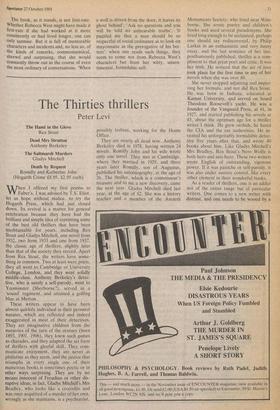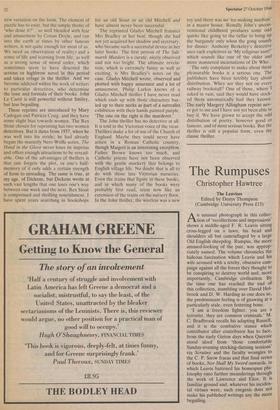The Thirties thrillers
Peter Levi
The Hand in the Glove Rex Stout Dead Mrs Stratton Anthony Berkeley The Saltmarsh Murders Gladys Mitchell Death by Request Romilly and Katherine John (Hogarth Crime £8.95, £2.95 each)
When I offered my first poems to Faber's, I was advised by T.S. Eliot, let us hope without malice, to try the Hogarth Press, which had just closed down. Its revival is a matter for general celebration because they have had the brilliant and simple idea of reprinting some of the best old thrillers that have been unobtainable for years, including Rex Stout and Gladys Mitchell, one novel from 1932, two from 1933 and one from 1937, the classic age of thrillers, slightly later than that of the society they record. Apart from Rex Stout, the writers have some- thing in common. Two at least were poets, they all went to Cambridge or University College, London, and they were solidly middle-class. Anthony Berkeley's detec- tive, who is surely a self-parody, went to Yeominster (Sherborne?), served in a 'sound' regiment, and attained a golfing blue at Merton.
These writers appear to have been almost quirkily individual in their personal natures, which are reflected and indeed exaggerated in most of their detectives. They are imaginative children from the nurseries of the turn of the century (born 1893, 1901, 1906), they knew such games as charades, and they adapted the set form of thrillers with gleeful skill. They com- municate enjoyment, they are never as philistine as they seem, and the justice that triumphs in every single one of their numerous books is sometimes poetic or in other ways surprising. They are by no means innocent of Freudian or other dis- ruptive ideas; in fact,'Gladys Mitchell's Mrs Bradley, who looks like a crocodile and was once acquitted of a murder of her own, wrongly as she maintains, is a psychiatrist,
possibly lesbian, working for the Home Office.
They are nearly all dead now. Anthony Berkeley died in 1978, having written 24 novels. Romilly John and his wife wrote only one novel. They met at Cambridge, where they married in 1929, and three years later Romilly, son of Augustus, published his autobiography, at the age of 26. The thriller, which is a connoisseur's treasure and to me a new discovery, came the next year. Gladys Mitchell died last year, at the age of 82. She was a history teacher and a member of the Ancient
Monuments Society, who lived near Wim- borne. She wrote poetry and children's books and used several pseudonyms. She lived long enough to be acclaimed, perhaps one should say rediscovered, by Philip Larkin in an enthusiastic and very funny essay, and the last sentence of her last, posthumously published, thriller is a com- pliment to that great poet and critic. It was her 66th. He noticed that the act of love took place for the first time in any of her novels when she was over 80.
She never stopped adjusting and impro- ving her formula, and nor did Rex Stout. He was born in Indiana, educated at Kansas University, and served on board Theodore Roosevelt's yacht. He was a founder of the Vanguard Press, at 41, in 1927, and started publishing his novels at 43, about the optimum age for a thriller writer I think. He grew orchids, he hated the CIA and the tax authorities. He in- vented his unforgettably formidable detec- tive five years after that, and wrote 40 books about him. Like Gladys Mitchell's Mrs Bradley, Rex Stout's Nero Wolfe is both hero and anti-hero. These two writers wrote English of outstanding, vigorous power. If it was pastiche or self-parody, it was also under austere control, like every other element in their wonderful books.
As a reader of thrillers, one is an addict not of the entire range but of particular writers. One comes to a new writer with distrust, and one needs to be wooed by a new variation on the form. The element of puzzle has to exist, but the simple theme of 'who done it?' , so well blended with fear and amusement by Conan Doyle, and run into the earth at times by other famous writers, is not quite enough for most of us. We need an observation of realityr and a sense of life and learning from life, as well as a strong sense of moral order, which sometimes seem to have deserted the serious or highbrow novel in this period and taken refuge in the thriller. And we become addicted within the work of writers to particular detectives, who determine the tone and formula of their books. John Le Carre is still powerful without Smiley, but less beguiling.
These reprints are introduced by Mary Cadogan and Patricia Craig, and they have some slight bias towards women. The Rex Stout chosen for reprinting has two women detectives. But it dates from 1937, when he was well into his stride; he had already begun the masterly Nero Wolfe series. The Hand in the Glove never loses its impetus and offers enough attractions to be reread- able. One of the advantages of thrillers is that one forgets the plot, or one's half- memory of it only adds a certain strength of form to rereading. The same is true, at my age, of Dickens, but Dickens wrote at such vast lengths that one loses one's way between one week and the next. Rex Stout is compressed and thrilling nourishment. I have spent years searching in bookshops for an old Stout or an old Mitchell and have almost never been successful.
The reprinted Gladys Mitchell features Mrs Bradley at her best, though she had not yet acquired her shadow and secretary, who became such a successful device in her later books. The first person of The Salt- marsh Murders is a curate, nicely observed and not too bright. The ultimate revela- tion, which is extremely funny as well as exciting, is Mrs Bradley's notes on the case. Gladys Mitchell wrote, observed and plotted with happy assurance and a lot of amusement. Philip Larkin knows of a Gladys Mitchell thriller I have never read, which ends up with three characters bur- ied up to their necks as part of a surrealist exhibition with their hands painted purple. 'The one on the right is the murderer.'
The John thriller has no detective at all. It is told in the Victorian voice of the vicar. Thrillers-make a lot of use of the Church of England. Maybe they could never have arisen in a Roman Catholic country, though Maigret is an interesting exception. Father Brown knows too much, and Catholic priests have not been observed with the gentle mockery that belongs to English village life. No doubt that is all to do with those late Victorian nurseries. Even the trains that figure in these books, and in which many of the books were probably first read, seem now like an extension of the trains on the nursery floor. In the John thriller, the wireless was a new
toy and there was no 'ice-making machine' in a manor house. Romilly John's uncon- ventional childhood produces some odd quirks like going to the cellar to bring up the burgundy only when the gong sounds for dinner. Anthony Berkeley's detective uses such expletives as 'My religious aunt!' which sounds like one of the older and more mannered incarnations of Dr Who.
The only complaint to make about these pleasurable books is a serious one. The publishers have been terribly lazy about distribution. Whey are they not on every railway bookstall? One of those, where I asked in vain, said they would have stock- ed them automatically had they known. The early Margery Allingham reprint nev- er got to me and I have not yet been able to buy it. We have grown to accept the odd distribution of poetry, however good or famous, and of most serious books. But the thriller is still a popular form, even the classic thriller.



















































 Previous page
Previous page